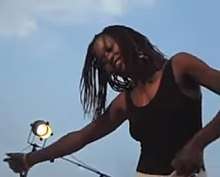Dorothée Munyaneza
Dorothée Munyaneza (born 1982) is a British-Rwandan singer, actress, dancer and choreographer. She has produced two performance pieces, Samedi Détente and Unwanted, both about the Rwandan genocide.
Dorothée Munyaneza | |
|---|---|
 Dorothée Munyaneza singing and dancing at the Farniente Festival in Saint-Nazaire in 2013 | |
| Born | 1982 (age 37–38) Kigali, Rwanda |
| Nationality | Rwandan, British |
| Occupation | Singer Actress Dancer Choreographer |
| Years active | 2004– |
Notable work | Samedi Détente Unwanted |
Personal life
Munyaneza was born in Kigali, Rwanda.[1] Her father is a pastor, and her mother is a journalist.[2] Munyaneza and her family left Kigali during the Rwandan genocide, when Munyaneza was aged 12.[1] Her mother worked for a non-governmental organisation, and was therefore able to secure the family a safe passage to London.[2][3][4] There she studied at the Lycée Français Charles de Gaulle. Whilst studying, she met Christine Sigwart, founder of the Jonas Foundation, a charity that aims to help integrate immigrant children. She became interested in music, and studied music at the Jonas Foundation.[2][5] Munyaneza studied music and social sciences at Canterbury Christ Church University.[6] She now resides in Marseille, France,[2][6] and has a daughter.[4]
Career
Munyaneza was inspired to work on the Rwandan genocide topic after seeing documentaries on the subject, especially one by Thierry Michel about the work of Denis Mukwege.[7]
Munyaneza worked on the sound track for the Hotel Rwanda film. She started out as a singer and storyteller for the film, but then started dancing in a style similar to how she had danced as a child in Rwanda.[1] She worked with François Verret, Robyn Orlin, Rachid Ouramdane, Nan Goldin, Mark Tompkins, Ko Murobushi and Alain Buffard.[1][4][8] As a singer, she released her first solo album in 2010, which was produced by Martin Russell.[6][9] In 2012, she collaborated with British composer James Seymour Brett to produce the album Earth Songs.[6][9] In 2013, she starred in a performance by Rachid Ouramdane in Rennes, France. During the performance, she chanted the names of Algerians killed during the Paris massacre of 1961.[4]
In 2014, Munyaneza produced the work Samedi Détente (Saturday relaxation). It focused upon the Rwandan genocide, how 800,000 people died in 100 days,[10] and her own personal experience of the genocide.[11] The work debuted in Nîmes, France.[12]
In 2017, she produced Unwanted, her second work about the Rwandan genocide.[1] The work featured French composer Alain Mahé,[1] and focused on interviews between Munyaneza and survivors of the genocide,[3] as well as women in Congo, Chad, Syria, and the countries that were formerly part of the SFR Yugoslavia.[1][7] Unwanted has a particular focus on raped women and their conceived children.[11] Munyaneza presented Unwanted at the 2017 Festival d'Avignon,[13][14][15] and also at the Festival d'automne à Paris.[11]
References
- Sulcas, Roslyn (19 September 2017). "Making Dance Out of the Unspeakable". The New York Times. Retrieved 6 December 2018.
- Barbier, Marie-Ève (18 June 2017). "Dorothée Munyaneza, la résiliente". La Provence. Retrieved 6 December 2018.
- Hsaio, Irene (27 September 2018). "With Unwanted, Dorothée Munyaneza creates a spectacle of grief and resilience". Chicago Reader. Retrieved 6 December 2018.
- Beauvallet, Ève (19 January 2015). "DOROTHÉE MUNYANEZA, UNE DANSEUSE DE HAUT VOLT". Libération (in French). Retrieved 6 December 2018.
- "Dorothée Munyaneza, chorégraphe, chanteuse et rescapée du génocide du Rwanda". Agence France-Presse (in French). 7 July 2017. Retrieved 6 December 2018 – via Le Point.
- Donohue, Maria (21 September 2017). "Refusing to Bow Down: Dorothée Munyaneza speaks about "Unwanted"". Culture Bot. Retrieved 6 December 2018.
- Bloom, Nicola (September 2017). "Dorothée Munyaneza about UNWANTED". French Culture. Retrieved 6 December 2018.
- Chouaki, Yasmine (6 November 2016). "Dorothée Munyaneza (Rediffusion)". Radio France Internationale (in French). Retrieved 6 December 2018.
- "Baryshnikov Arts Center Presents Dorothée Munyaneza / Compagnie Kadidi Unwanted". Baryshnikov Arts Center. September 2017. Retrieved 20 December 2018.
- Soloski, Alexis (15 January 2016). "Review: 'Samedi Détente' Looks Back at the Horrors of Rwanda". The New York Times. Retrieved 6 December 2018.
- Cappelle, Laura (12 December 2017). "Dance at the Festival d'Automne, Paris — imagination and promis". Financial Times.
- ""Samedi détente", une pièce de Dorothée Munyaneza pour dire le génocide rwandais". Agence France-Presse (in French). 27 April 2017. Retrieved 6 December 2018 – via France Info.
- Waberi, Abdourahman (29 March 2017). "De Paris à Kigali, l'art fait le printemps". Le Monde. Retrieved 6 December 2018.
- Maalouf, Muriel (9 July 2017). "Festival d'Avignon 2017: «Unwanted» de Dorothée Munyaneza". Radio France Internationale (in French). Retrieved 6 December 2018.
- Beauvallet, Ève (13 July 2017). "DOROTHÉE MUNYANEZA, AU CHŒUR DES TÉNÈBRES". Libération (in French). Retrieved 6 November 2018.